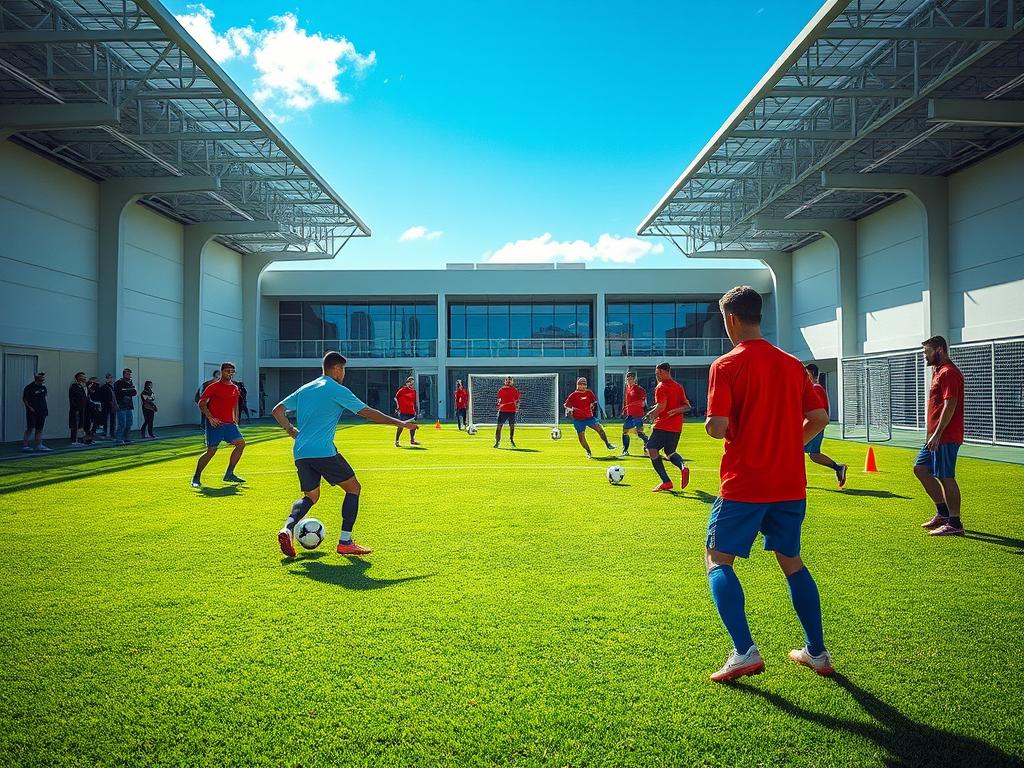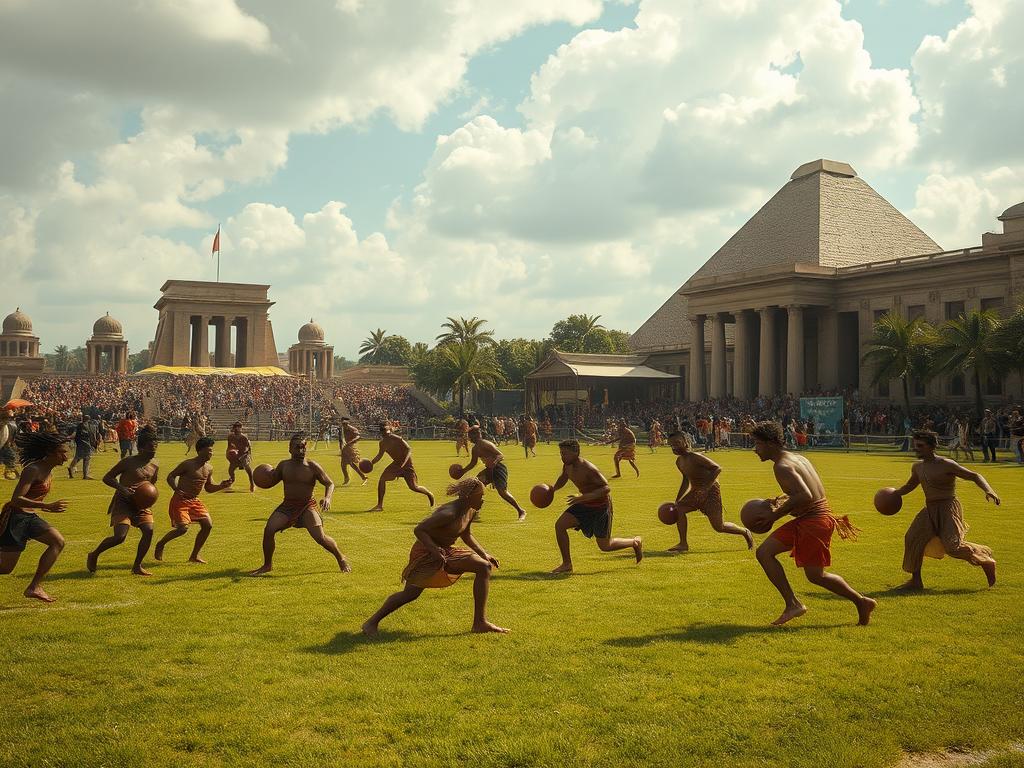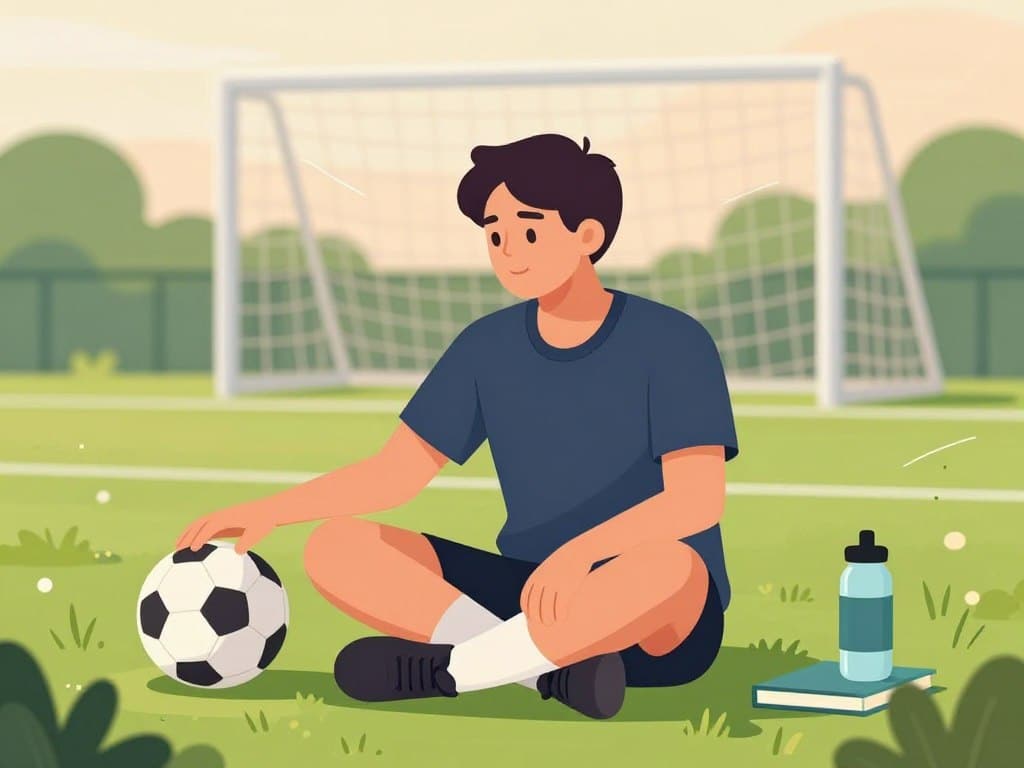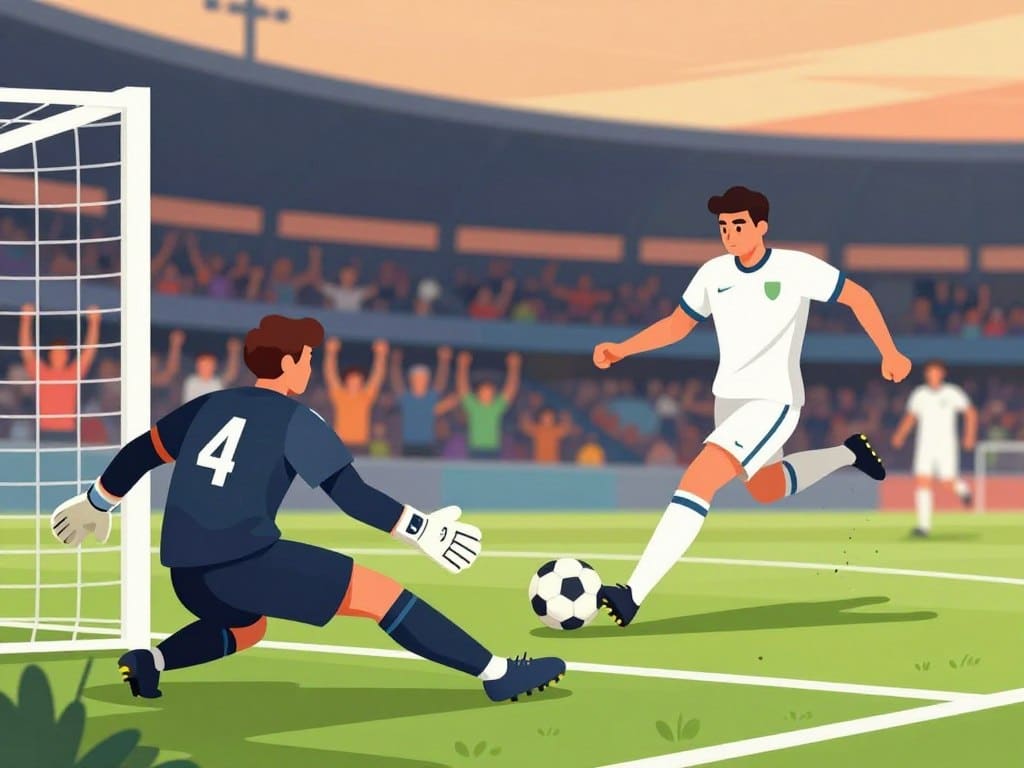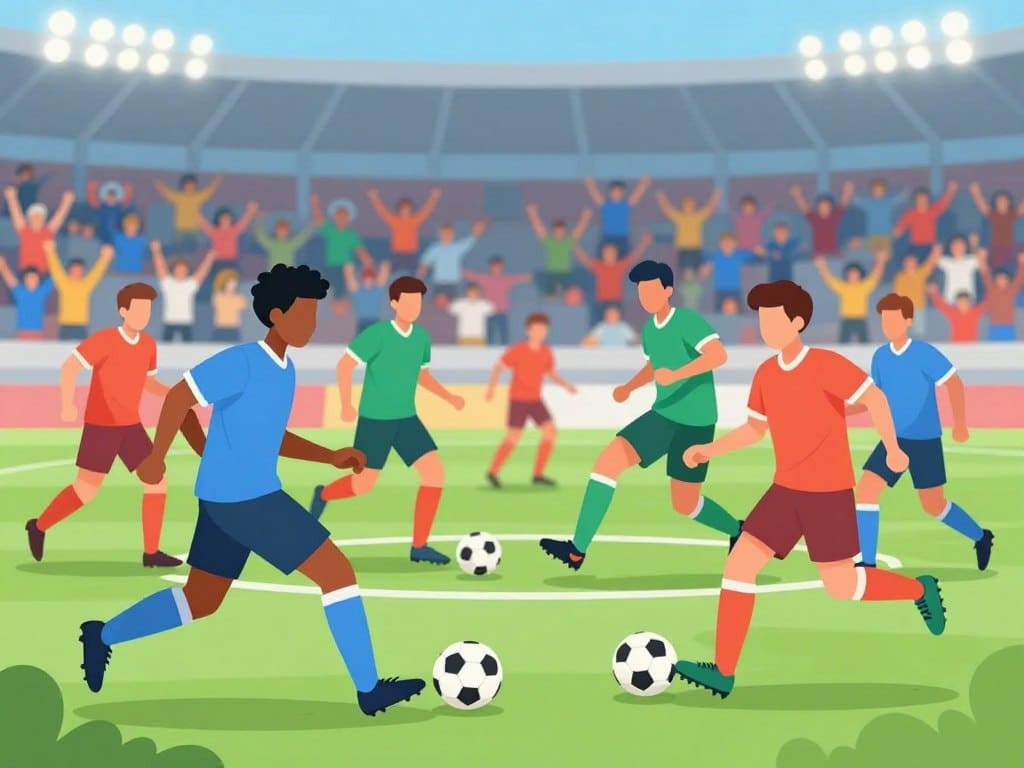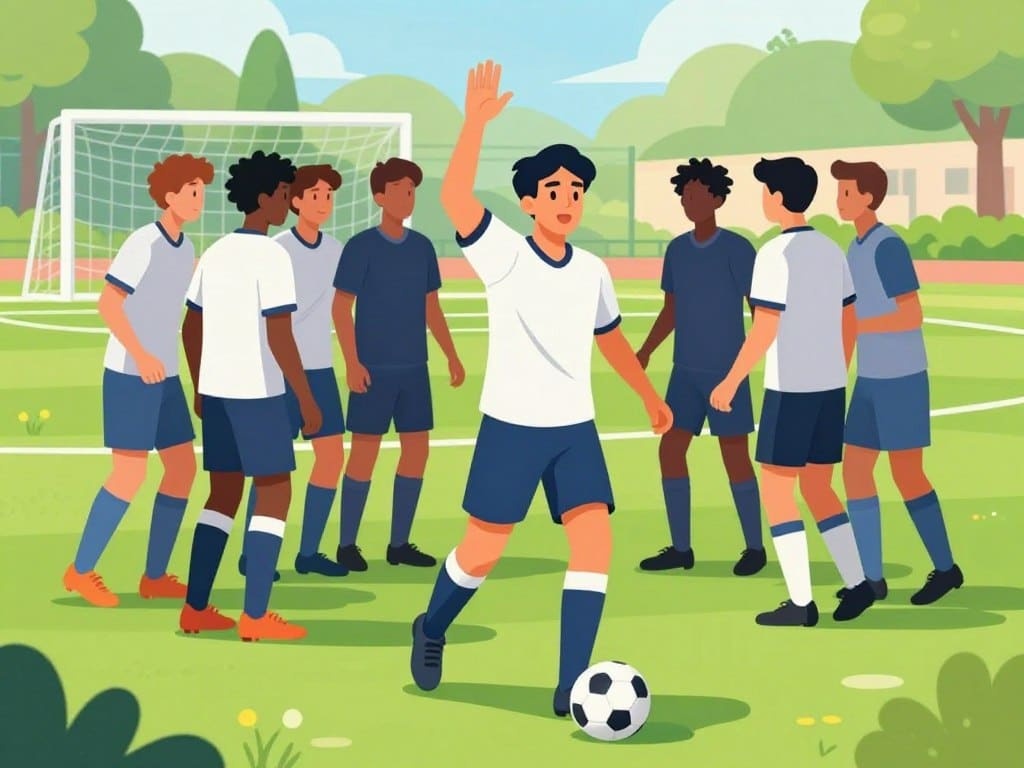Ever wondered what it’s like to be a pro soccer player? Their work environment is much tougher than you might imagine. They deal with tough training and high-stakes games every day. Let’s take a closer look at their lives.
Pro soccer players work about 35-40 hours a week. But their dedication goes way beyond that. They spend their days in intense training, meetings, and therapy. They work in top-notch indoor gyms and outdoor fields, no matter the weather.
Training is a big part of their job, with sessions 5-6 times a week. Stars like Lionel Messi and Cristiano Ronaldo show their hard work. Their dedication to improving is what makes them stand out.
But it’s not just about being fit. Mental strength is key to their success. They need to stay focused and disciplined under pressure. Being a pro soccer player means being in top shape, both physically and mentally.
Daily Life and Training Schedule of Professional Soccer Players
A pro soccer player’s day is filled with activities to keep them at their best. Their routine includes physical and mental preparation, starting early and lasting all day.
Early Morning Preparation and Facility Arrival
Most soccer players wake up before the sun rises. They eat a healthy breakfast and then go to the training facility. This early start prepares them for a day of hard work and focus.
Pre-Training Routines and Physical Therapy
When they arrive at the facility, players start their pre-training routines. These include:
- Warm-up exercises
- Stretching
- Physical therapy sessions
- Core strength workouts
Physical therapy is key to preventing injuries and keeping players in top shape. It’s a big part of their daily routine.
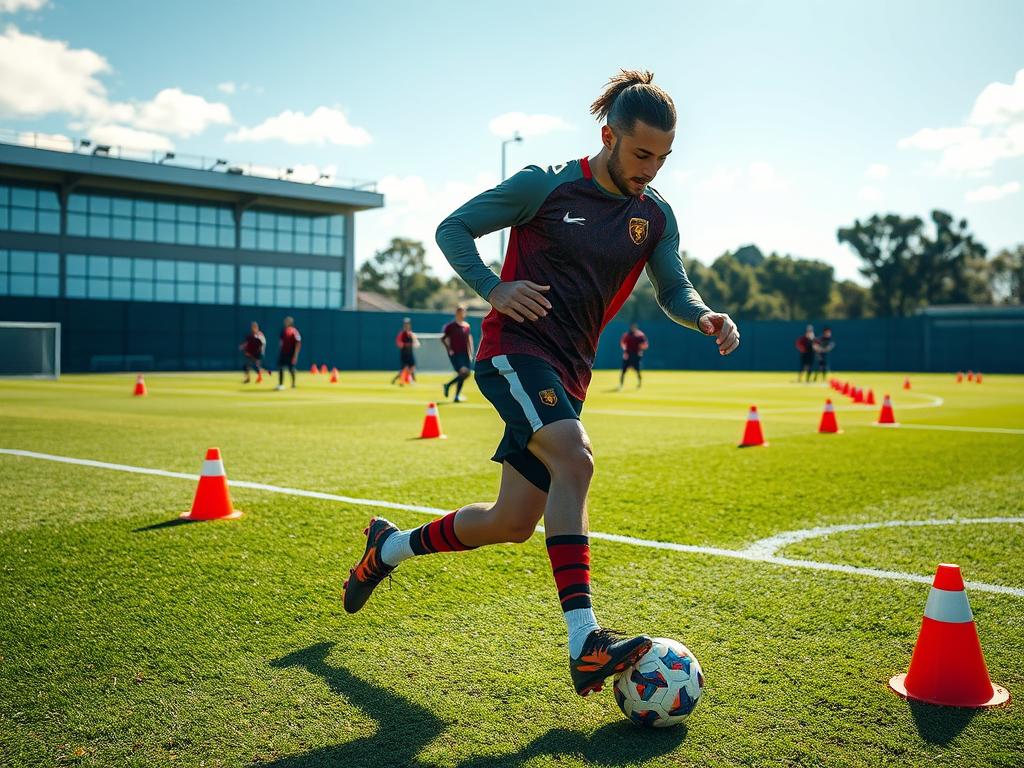
Training Sessions and Team Activities
The heart of a soccer player’s day is training and team activities. These include:
- Technical drills to improve ball control and passing accuracy
- Tactical sessions to enhance game awareness
- Scrimmages to simulate match conditions
- Position-specific workouts (e.g., goalkeepers focus on agility and reflexes)
Daily training is tough and varied, aiming to boost all aspects of a player’s game. Team activities help build teamwork and improve communication, key for success in soccer.
What is the Work Environment for a Professional Soccer Player
Professional soccer players face many challenges. They work in both indoor and outdoor settings. These places help them improve their skills and work together as a team.
Indoor and Outdoor Training Facilities
Soccer training places are different. Indoor areas keep the weather out, so players can practice all year. Outdoor fields are like the real game, with weather and everything.
These places have:
- Practice fields
- Weight rooms
- Recovery areas
- Video analysis rooms
Physical Demands and Safety in Soccer
Being a pro soccer player is tough. They stand, run, and change direction fast. They work about 35-40 hours a week.
They focus on:
- Strength training
- Endurance building
- Skills practice
Safety is key in soccer. Clubs give special gear and follow rules to avoid injuries. But, players can get hurt from hitting each other or doing the same thing over and over.
Team Dynamics and Interpersonal Relationships
Working well with others is important for soccer players. Good relationships help them play better. They spend a lot of time:
- Practicing together
- Analyzing game footage
- Doing team-building activities
This close team helps players know each other’s good points and bad. This makes them work better together during games.
Professional Athlete Work Schedule and Commitments
Soccer players work long hours, often 35-40 hours a week. They spend time on training, matches, and traveling. Their schedules are full, with many commitments off the field too.

Stars like Lionel Messi make millions, but most athletes earn around $47,200. Only 1% make it to the pro level, and careers last about 10 years. Athletes train almost every day, working on endurance, strength, speed, and technique.
Student-athletes face a big challenge. They must balance school and sports. A typical day looks like this:
- Morning classes: 9:00 AM – 11:00 AM
- Afternoon classes: 1:00 PM – 3:00 PM
- Practice: 4:00 PM – 6:00 PM
- Study time: 8:00 PM – 9:00 PM
- Bedtime: 10:00 PM
Universities support student-athletes with academics and money. This helps them keep good grades while chasing their sports dreams. The hard work teaches them to manage time, lead, and work as a team. It prepares them for a career in sports.
Physical and Mental Demands of Soccer Career
A pro soccer career is tough. Players must be dedicated and resilient. They have to keep up with a demanding schedule to stay at the top.
This path is hard, with only 1% of young players making it to the pros. It starts early, with a lot of hard work.
Training Under Professional Coaching
Professional coaches teach important skills:
- Ball control
- Passing accuracy
- Dribbling skills
- Shooting technique
- Physical fitness
Players practice these skills every day. They also work on speed, agility, and stamina. This helps them meet the game’s physical needs.
Performance Assessment and Improvement
Coaches constantly assess players’ performance. They look at strengths and weaknesses after each game. This helps players set goals and get better.
Mental toughness is also key. Players need confidence, focus, and resilience to do well under pressure.
Recovery and Injury Prevention in Soccer
Preventing injuries is very important in soccer. Players follow strict recovery routines. This includes physical therapy and special exercises.
It’s also important to balance soccer with personal life. Players must manage their time well to stay healthy and happy.
Soccer is a challenging but rewarding career. It needs physical strength, mental toughness, and a strong commitment. Players who excel can reach the highest levels in the sport.
Professional Soccer Player Workplace Characteristics
The soccer workplace environment is special. It combines top-notch facilities with a team-focused atmosphere. Players live a professional athlete lifestyle, needing to be in top shape and mentally strong.
They work in state-of-the-art training centers with the latest gear and expert coaches. This setup is designed for success.
A soccer career is all about intense competition and always improving skills. Players must quickly adjust to different playing styles and strategies. They make key decisions that help the team win.
The job stresses teamwork, blending individual talent with team success. This teamwork is key to winning games.
There are many chances to play in both domestic and international leagues. Yuta Nomura, for example, moved from playing in Sweden to coaching in the New England Revolution II. His story shows how soccer careers can span the globe.
Nomura’s journey emphasizes the need to be adaptable and persistent in soccer.
Career growth in soccer is promising. Athletic trainers, essential for player health, can see a 14% job growth rate from 2022 to 2032. They earn a median salary of $57,930 a year.
Sports data analysts are also in demand, with a 30% growth rate expected. These roles show the many career paths available in soccer.

